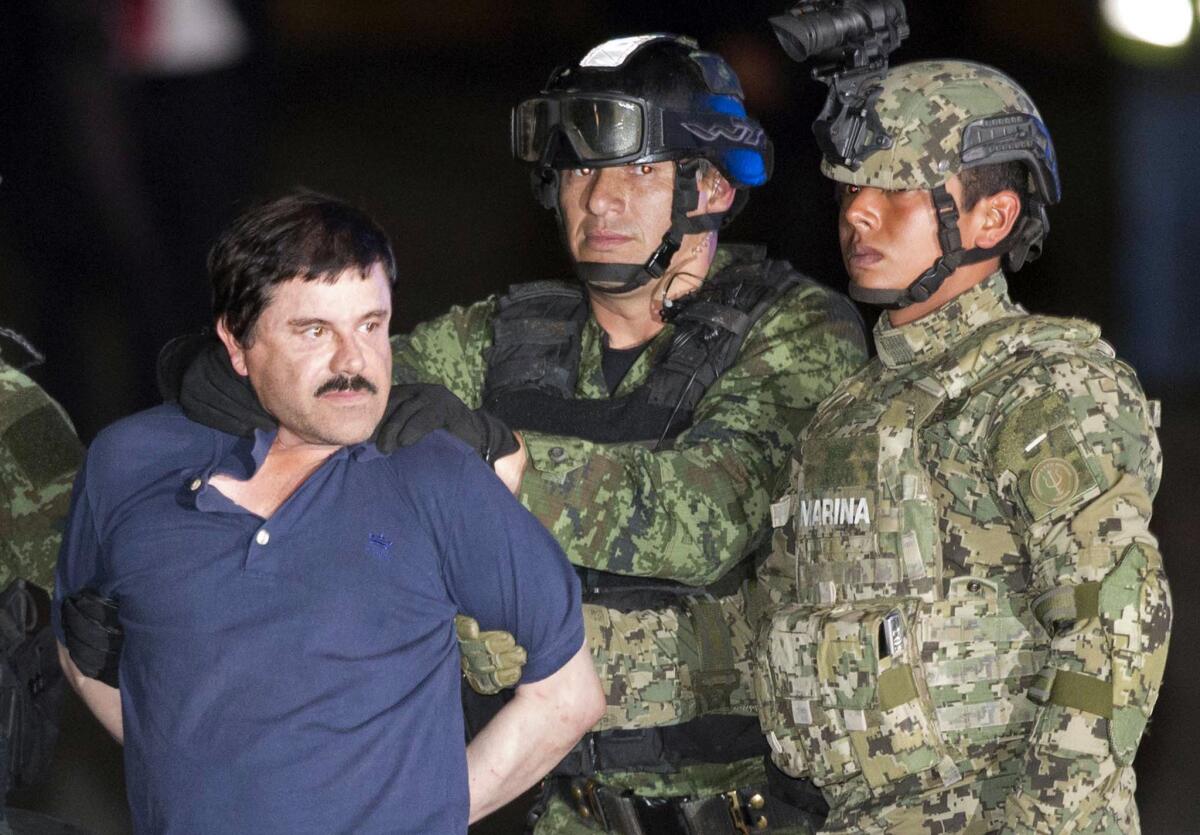Mexico transfers drug lord ‘El Chapo’ to a prison in Ciudad Juarez

Drug lord Joaquin “El Chapo” Guzman is made to face the press as he is escorted to a helicopter in handcuffs in Mexico City after his recapture in January.
Mexico’s most notorious inmate and prison escape artist has a new home: a cell in Ciudad Juarez, the city across the Rio Grande from Texas that has long been a hub for cross-border drug trafficking and human smuggling.
Joaquin “El Chapo” Guzman, the convicted drug kingpin who has twice broken out of Mexican prisons in sensational fashion and is currently fighting extradition to the United States, has been transferred from a maximum-security lockup outside the capital to a prison in Juarez, Mexican officials confirmed Saturday.
The move, carried out late at night, immediately sparked speculation in the Mexican media that Guzman was being moved because of security concerns or as a precursor to possible extradition to the United States, where he faces charges.
However, Mexican authorities described the move as a routine transfer while officials work on security upgrades at the so-called Altiplano facility outside Mexico City where Guzman had been held. The government also called the transfer part of an ongoing policy of rotating prisoners as a security precaution.
Officials said the Juarez prison, known as Federal Social Re-adaptation Center No. 9, was also a maximum-security institution.
While Mexican officials did not reveal any possible escape plots, the governor of Chihuahua state, which includes Juarez, told reporters the transfer was meant to ensure Guzman did not break out again. Gov. Cesar Duarte said conditions were more secure in Juarez than at the Altiplano prison.
“There is no risk of an escape” from the Juarez facility, Duarte assured journalists Saturday at a news conference.
Various experts said the transfer was likely unrelated to Guzman’s prospective extradition to the United States, and he continues to pursue several legal avenues to block that process, one of Guzman’s lawyers, Jose Refugio Rodriguez, was quoted as saying in the Mexican newspaper Milenio.
“I don’t see that the transfer has anything to do with the extradition,” the lawyer said.
The newspaper described Guzman’s transfer as a high-security operation that involved both a helicopter and an airplane and began at 9 p.m. Friday, ending at 3 a.m. Saturday.
Guzman, head of the powerful Sinaloa drug cartel, is a legendary figure in Mexico and has sometimes been called the world’s wealthiest and most powerful drug trafficker. Mexico has had difficulties finding a lockup that can hold the elusive kingpin.
Guzman pulled off a cinematic breakout July 11 from the Altiplano prison, which authorities had labeled escape-proof. The breakout via a mile-long tunnel connected to the shower stall in his cell was a bruising embarrassment for the government of President Enrique Peña Nieto.
It was Guzman’s second sensational escape act. In January 2001, he decamped from a high-security Mexican prison, reportedly with help from bribed prison staff. He ran his expanding drug business as a fugitive for the next 13 years before being captured again in February 2014.
Following his flight from Altiplano prison, Guzman was captured in January in the Pacific coastal city of Los Mochis. Since his return to Altiplano, Guzman has been subjected to an intense security regimen, including 24-hour camera surveillance in a cell reinforced with thick concrete and iron bars, and a reduced number of visitors.
Guzman’s family and legal representatives have mounted a public relations campaign alleging that tight security measures have allowed Guzman little sleep and have endangered his health. Mexican authorities have insisted that his rights and those of other inmates have been respected.
Word of Guzman’s transfer to Juarez — where his Sinaloa cartel is reported to dominate drug trafficking, though rival factions still exist — prompted a wave of mocking comments on Mexican social media, where skepticism about government motives abounds. Many commentators viewed the border city, with its reputation for lawlessness and corruption, as an odd choice.
Some suggested Guzman’s reported transfer would somehow facilitate the kingpin’s next escape, possibly to the United States. Some even wondered if Guzman was already at large and if the move to Juarez was just a cover story.
Twitter: @mcdneville
Special correspondent Cecilia Sanchez contributed to this report.
ALSO
In Pakistan, militants raise alarm with their ‘Court of Sharia’
In North Korea and trapped in a real-life version of ‘Waiting for Godot’
Mexico’s Vicente Fox: Why a Trump presidency should scare both Mexicans and Americans



